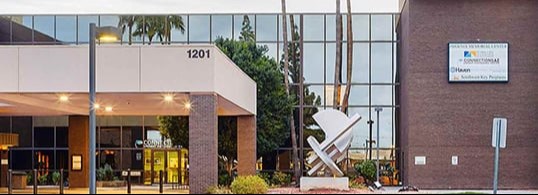In the world of addiction and mental health recovery, the journey is often marked by twists and turns, setbacks and triumphs. I have been in recovery for five years, and my story is a testament to the resilience of the human spirit, the potential for transformation, and the vital role of peer support in crisis stabilization programs.
Abyss of addiction
My story began with a single decision – the choice to try methamphetamine. I was a regular guy with a job and a loving family, but the grip of addiction took hold of my life. My life spiraled out of control, and I turned to stealing to feed my addiction. In 2007, I was convicted and sentenced to 2.5 years in Arizona State Prison.
After my release, I relapsed and as depression settled in, I turned to drugs more heavily and was convicted of organized retail theft and sentenced to five years in prison. It was this stay in prison that changed my life.
Role of a peer recovery support specialist
I was desperate for change but unsure of how to achieve it. During my second sentence, I met Mrs. Waite, a prison counselor who introduced me to a peer recovery support program.
Peer recovery support specialists (PRSS) have lived experience with mental health and substance use challenges. A PRSS is not just another member of a crisis care team; they are a beacon of hope, someone who has walked the same path as the individuals they serve offering a unique form of support. PRSS play a vital role by bridging the gap between individuals in crisis and the crisis care team, providing a level of understanding and empathy that can be hard to find elsewhere.
Seeing the profound impact of a peer, I became a certified PRSS, and when I was completing my prison sentence, I taught recovery classes and life skills while also earning two associate degrees. My life was changed. On Sept. 3, 2018, after serving almost five years, I was released and started my new journey.
Beacon of hope
I applied to a PRSS position at Connections Health Solutions and was hired 30 days after my release. Connections provides 24/7 care and treatment to any person in crisis, regardless of financial situation or background, in a safe and treatment-oriented environment in Phoenix and Tucson.
As part of the crisis care team, peers advocate for people in recovery, pulling from their lived experience to help individuals in crisis get the support they need. Peers help individuals access resources, teaching them how to rebuild their lives and develop essential life skills. They lead recovery groups for sharing experiences and learning from others - providing a safe space. Peers also play a crucial role in reducing the stigma associated with mental health and substance use challenges. Seeking help is a sign of strength, not weakness.
Brighter future
After five years at Connections, I have taken on new roles that allow me to connect more directly with the community and share information on the life-saving services Connections provides.
It’s my belief that peer recovery support specialists are the unsung heroes of our crisis response system. As we continue to invest in mental health and addiction services, recognizing the vital role of PRSS is paramount for a more compassionate and effective crisis response system.
Matt Shafer is community development manager at Connections Health Solutions in Phoenix.



